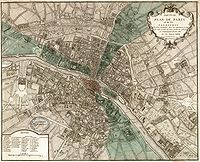
Historical geography
Encyclopedia

Human geography
Human geography is one of the two major sub-fields of the discipline of geography. Human geography is the study of the world, its people, communities, and cultures. Human geography differs from physical geography mainly in that it has a greater focus on studying human activities and is more...
, physical
Physical geography
Physical geography is one of the two major subfields of geography. Physical geography is that branch of natural science which deals with the study of processes and patterns in the natural environment like the atmosphere, biosphere and geosphere, as opposed to the cultural or built environment, the...
, fictional
Fictional geography
Fictional geography is the use of maps, text and imagery to create lands and territories to accompany works of fiction. Depending on the completeness and complexity of the work, varying media, levels of collaboration and a number of other factors, the depiction of geographical components to works...
, theoretical, and "real" geographies of the past. Historical geography
Geography
Geography is the science that studies the lands, features, inhabitants, and phenomena of Earth. A literal translation would be "to describe or write about the Earth". The first person to use the word "geography" was Eratosthenes...
studies a wide variety of issues and topics. A common theme is the study of the geographies of the past and how a place or region changes through time. Many historical geographers study geographical patterns through time, including how people have interacted with their environment, and created the cultural landscape.
Historical geography seeks to determine how cultural features of various societies across the planet emerged and evolved, by understanding their interaction with their local environment and surroundings.
For some in the United States, the term historical geography has a more specialized meaning: the name given by Carl Ortwin Sauer
Carl O. Sauer
Carl Ortwin Sauer was an American geographer. Sauer was a professor of geography at the University of California at Berkeley from 1923 until becoming professor emeritus in 1957 and was instrumental in the early development of the geography graduate school at Berkeley. One of his best known works...
of the University of California, Berkeley
University of California, Berkeley
The University of California, Berkeley , is a teaching and research university established in 1868 and located in Berkeley, California, USA...
to his program of reorganizing cultural geography (some say all geography) along regional lines, beginning in the first decades of the 20th century. To Sauer, a landscape and the cultures in it could only be understood if all of its influences through history were taken into account: physical, cultural, economic, political, environmental. Sauer stressed regional specialization as the only means of gaining sufficient expertise on regions of the world. Sauer's philosophy was the principal shaper of American geographic thought in the mid-20th century. Regional specialists remain in academic geography departments to this day. But some geographers feel that it harmed the discipline; that too much effort was spent on data collection and classification, and too little on analysis and explanation. Studies became more and more area-specific as later geographers struggled to find places to make names for themselves. These factors may have led in turn to the 1950s crisis in geography, which raised serious questions about geography as an academic discipline in the United States.
This sub-branch of human geography
Human geography
Human geography is one of the two major sub-fields of the discipline of geography. Human geography is the study of the world, its people, communities, and cultures. Human geography differs from physical geography mainly in that it has a greater focus on studying human activities and is more...
is closely related to history
History
History is the discovery, collection, organization, and presentation of information about past events. History can also mean the period of time after writing was invented. Scholars who write about history are called historians...
and environmental history
Environmental history
Environmental history, a branch of historiography, is the study of human interaction with the natural world over time. In contrast to other historical disciplines, it emphasizes the active role nature plays in influencing human affairs. Environmental historians study how humans both shape their...
. At many colleges it is a field of study in Historical studies.

